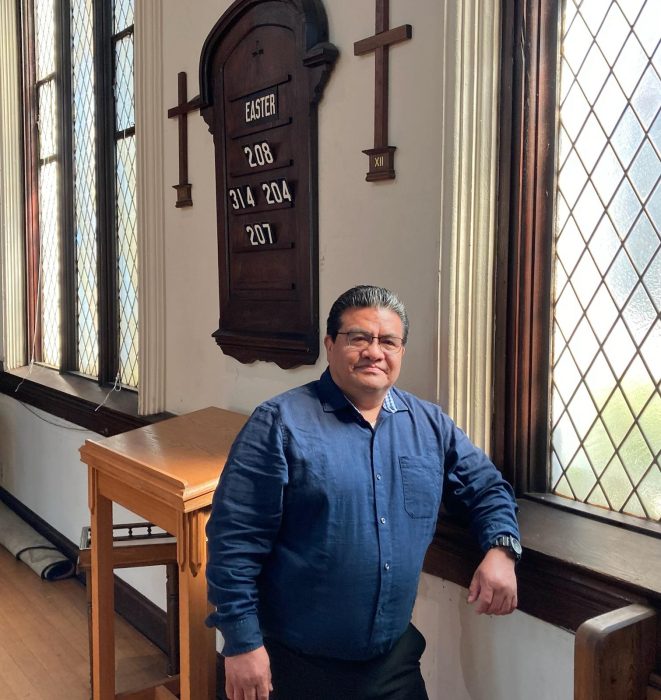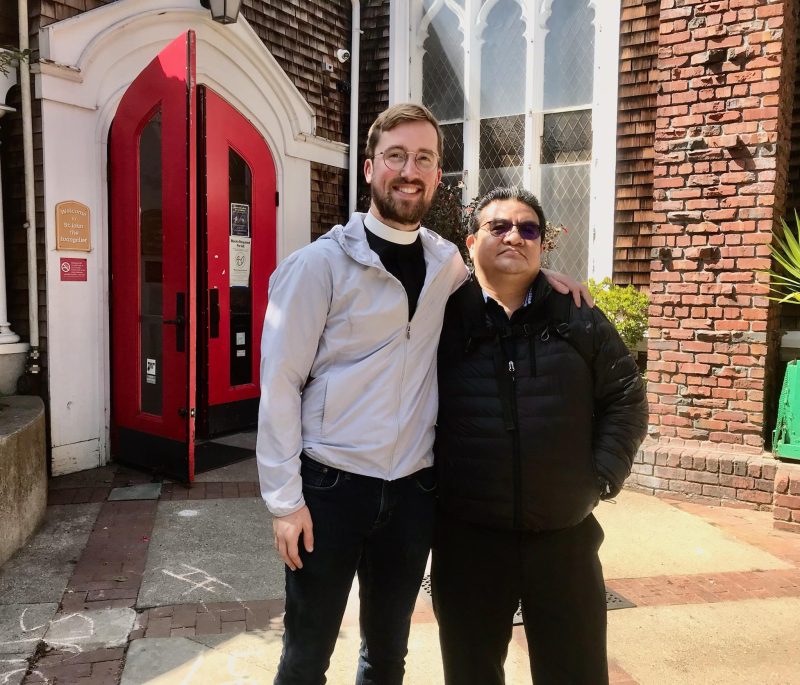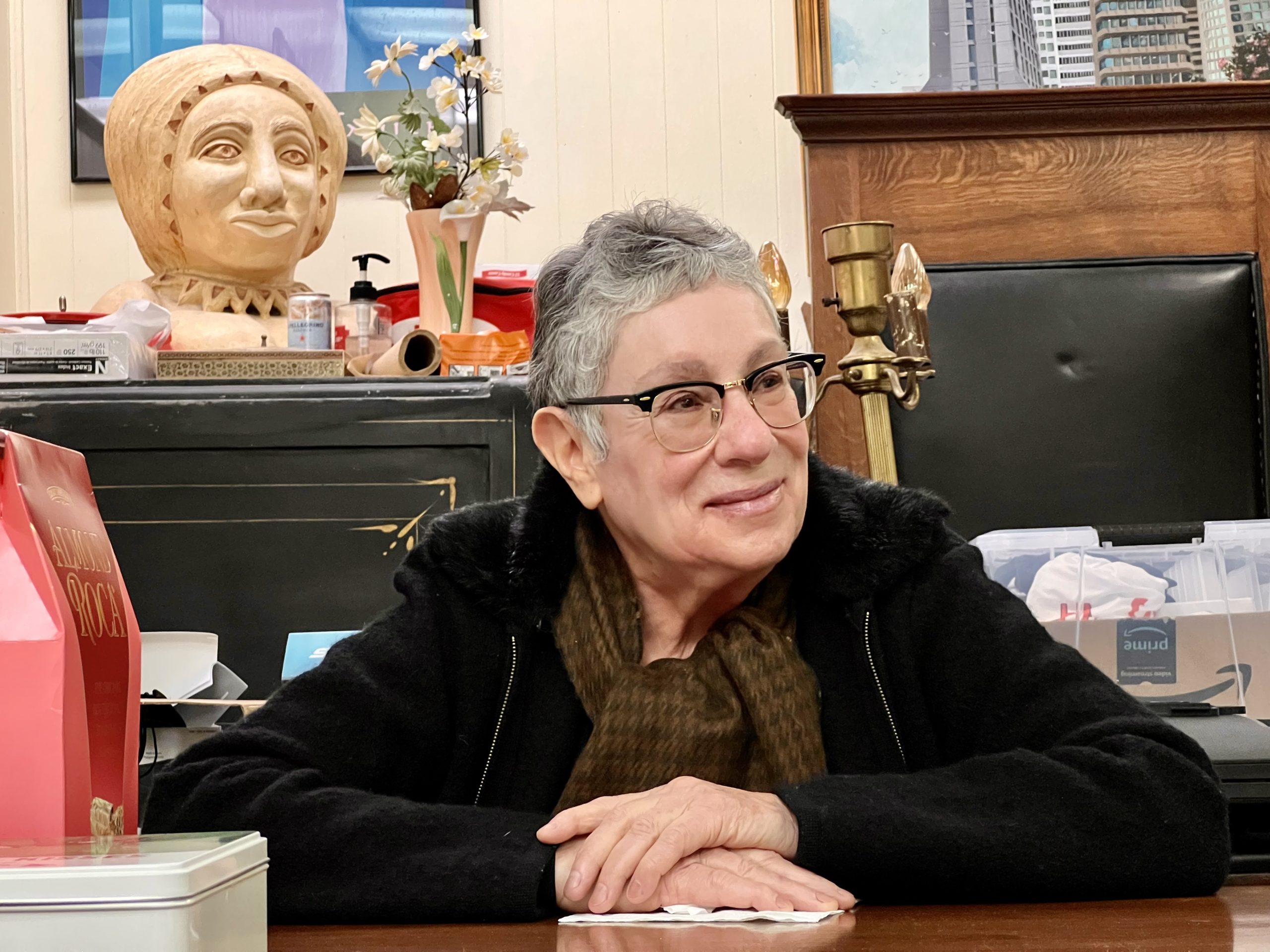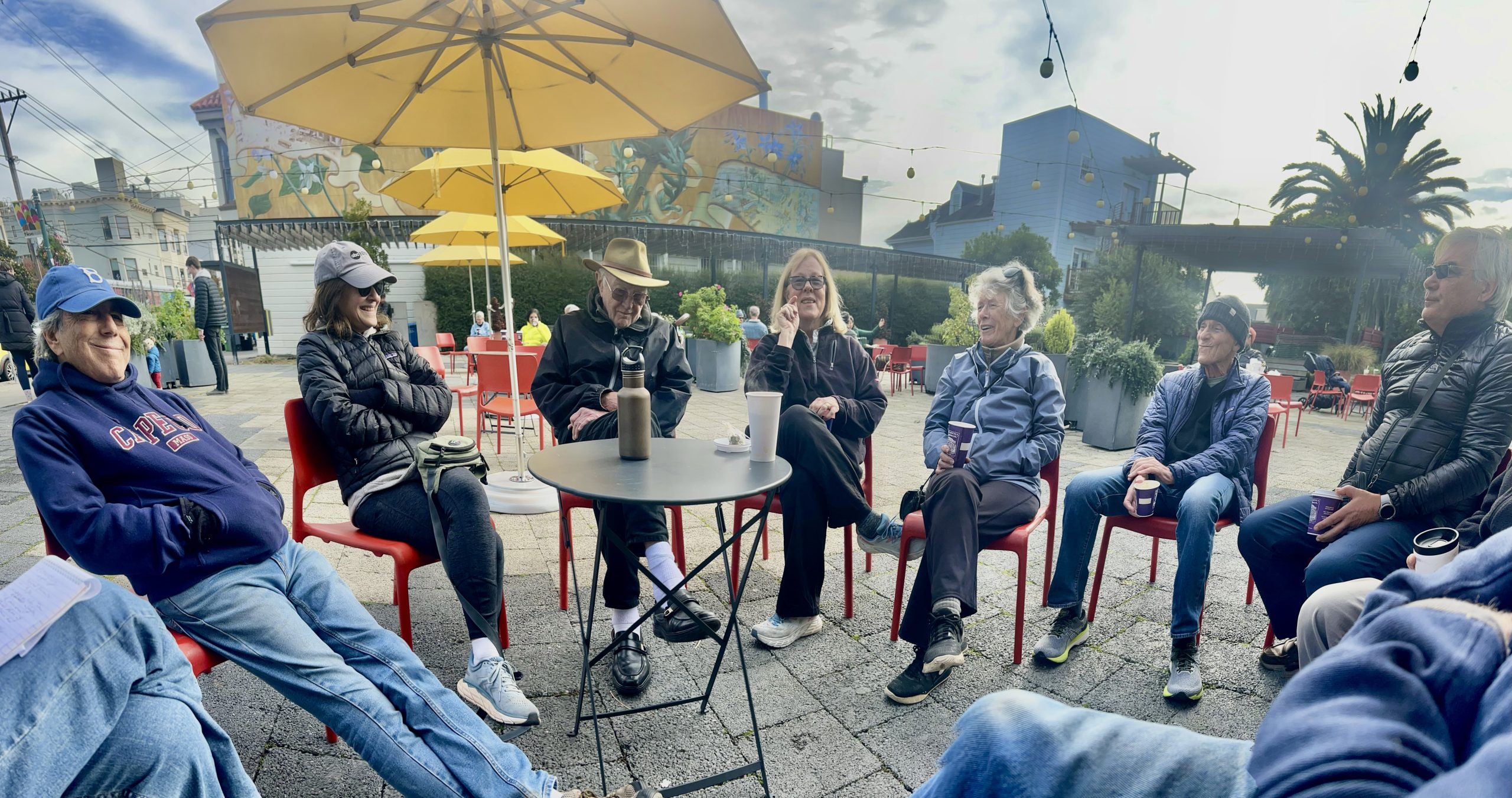Threats in Guatemala spark activist’s journey to a new land and language; after homelessness and despair, he finds resurrection in helping others like himself
Gonzalo Guoron arrived every morning at 5:45 a.m., threw open the doors at 6 a.m., and ushered 50 to 90 tired souls up all night in the cold into the warmth of the Episcopal Church of Saint John the Evangelist.
Until the pandemic closed those doors, Guoron was a hospitality monitor for the Mission District church’s Sacred Sleep Program. Participants could sleep safely in the pews.
“My best moments were welcoming everyone in: ‘Hello, good morning, come in, have a rest, have some food’,” Guoron said, “and I call them by their names. Many prefer their nicknames, so I learned those.”

“We have Chinese, Latino, Black and White. We even have Mayans from Guatemala, like me.,” he said. “We have old and young. Very old and very young. LGBTQ. Men, women. I put out mattresses on the pews, I make fresh coffee, I cut up the donated bread and pastries, I distribute hygiene kits, I make everyone feel comfortable in the sanctuary.”
Guoron’s made it to San Francisco 12 years ago. His journey from Guatemala was a flight from death threats by gangs unhappy with his human rights work. After crossing the Mexican border, he made his way to Oklahoma, where he washed dishes. In Los Angeles, he did roofing work. In Stockton and Napa, he picked fruit.
With a little help
Eventually, he migrated to the city, where he said he cleaned offices, lived in shelters and on the streets, and drank too much. But he also learned English at City College of San Francisco and volunteered at Arriba Juntos, a non-profit that helps immigrants learn job skills.
And despite other hardships, he finally got a visa to stay in the U.S. and was accepted into a San Francisco State University course that trained people with lived experience in trauma, addiction, post-traumatic stress and other issues to be frontline workers on the streets or in community-based organizations helping others like themselves.
With both bilingual and street survival skills, Guoron was a good fit.
“I learned to manage my own stress. I learned to deal with it, to calm it. I was able to stop all medicines,” he said. “I learned by sharing stories with my fellow students, and I learned to be more responsible to myself.”
Guoron, 54, hadn’t had much success overcoming depression and post-traumatic stress from his life’s upheaval –until he began working as a bilingual peer counselor with the homeless, many of them suffering from similar maladies.
After Guatemala’s civil war, local gangs tried to control the country’s natural resources, including water. Guoron at the time was a human rights activist and community organizer fighting for equitable access to wells and water – work that angered the gangs.
A friend assassinated
In 2003, a close colleague was assassinated. Guoron stayed on the job five years more, negotiating water rights for poor rural towns. But he was constantly harassed.
There were anonymous threatening phone calls. Gallons of gasoline were left at his house, with notes saying he would be burned at a roadside barricade he had to pass on his way to work. In 2008, he fled, leaving behind three daughters and his wife.
Using Google maps and his cell phone, he made his way across Mexico – alone. He crossed the border without incident and went to a small town in Oklahoma where he had a friend. He washed dishes until the winter. “I could not stand the cold,” he said.
He joined another Guatemalan friend who had a roofing business in Los Angeles, but the work was sporadic. By year’s end, he was picking tomatoes, pears and peaches in Stockton and Napa. The work was hard, and he tore up his hands cutting grapes. He’d heard San Francisco was a beautiful tourist city. “I thought there has to be work there,” he said.
A roller coast existence
So, in 2010, he made his way to San Francisco and lived, as he put it, “from street to shelter, sometimes from street to SRO to shelter, sometimes from street to another street. From street to car. From car to shelter.
“You know the shelter system. You only get a bed for three months, then you are out,” he said. For almost two years he was essentially homeless.
He worked two jobs most of those years, as a kitchen assistant on the Hornblower Cruises and as a janitor at Nordstrom.
One late night, walking from Civic Center to the Next Door Shelter where he was staying, he was violently assaulted and robbed. He reported it to the police and agreed to cooperate, but no one was caught.
The incident triggered previous traumas, and he fell into “a deep, horrible depression,” he said.
He was referred to therapy at the Mission Mental Health Clinic, where he saw a bilingual therapist and was treated with anti-depressants. His therapist referred him to Dolores Street Community Services, where, at no cost, an immigration attorney helped him obtain a U visa, for victims of certain crimes who have suffered mental or physical abuse.
Meaningful work
With his legal status resolved, he began looking for the meaningful work that had been his life in Guatemala. Then, in the fall of 2015, he was accepted into the one-semester San Francisco State University/RAMS course to become a peer mental health specialist.

He ran harm-reduction groups. He learned de-escalation techniques. And he found his place, working first as an outreach worker with the Mission SRO Collaborative, then as the hospitality monitor with St. John’s Sacred Sleep Program.
The work gave him the confidence and self-respect to reconnect with his family. He began calling his 90-year-old mother on Skype. Then he reached out to his daughters. In 2019, he went home while on Christmas vacation.
“It was so much happiness,” he said. “I felt the tenderness and harmony of being with my family after so much time gone by.”
Guoron knew the doors at St. Johns had to close when the shelter-in-place order came down in March 2020. When he returned from Guatemala, he tested negative for the coronavirus and went on unemployment. At first, he mostly stayed home in the Excelsior, reading a lot.
“I went to Target and bought books on science, on American history and biology. I decided to study. I just went out to get food and do laundry. At first. I kept hoping we would re-open.”
A pandemic setback
As the Pandemic dragged on, his boss at the Sacred Sleep program called to say there was no date to re-open. He got tested again, then embarked on a search for work. He’d been wondering where his former guests were finding themselves, and he went looking.
“So, I go out to Target – yes, I really like Target – near Fourth and Mission, across from the Marriott. I saw some of our guests there. I said, ‘What a joy to see you guys.’ They looked good, they looked clean. I could see they had slept well. Before, well, they always looked exhausted. So, I asked what happened.”
They had been staying in a hotel, courtesy of a city program.
” ‘They change our sheets once a week,’ they told me. ‘They give us laundry bags to throw our clothes in and do our laundry, and they only let us stay one person in one room.’”
Guoron pauses and laughs. “Some of them were even in the Marriott, “I didn’t believe it, but they looked so good. It’s an enormous irony that it took such a thing, a pandemic, a crisis, for them to get a dignified room, a dignified place to sleep with normal human conditions”
But walking home through the Mission, he ran across other former guests who weren’t so lucky.
“I see them outside the closed shelter, the Santa Ana on Dolores Street, the Marta y Maria near Capp. “When can we go back to the church?’ they ask me.”: He bows his head, taking in the contradictions: “How are some at the Marriott and some on the street outside the closed Santa Ana?”
Guoron went to Guatemala a second time, again at Christmas, to see his daughters, then ages 13, 29 and 28. The visit was short but good. “A short visit, very good, but as soon as I got back to San Francisco I felt sick. I was very weak and exhausted and ached all over. “
He tested positive for the coronavirus, then he isolated at home. “I live alone but the health department dropped off groceries, and I treated myself with teas: I made honey, lemon, ginger and garlic. I was sick for two weeks but am totally recovered.”

Now Guoron has a new job at the church.
“Hola, hola, hola!,” he greets a visitor, all high energy and volume. Cheery and with a gregarious demeanor, he smiles easily. He’s now the verger, or caretaker of the altar, at St. John’s.
A position of trust
It’s a position of trust, said the Rev. Kevin Neil. “The verger sets up the altar for the service, brings out chairs in the sanctuary, and ensures the safety of our space.”
The new role is part time but gives him time to do his other new job, on-call court interpreter. “I put up my profile on LinkedIn, and out of the blue, I was contacted by Alameda County,” he said. “In Hayward and the East Bay, there are many Guatemalan Kaqchikel speakers. They need interpreters who can speak language.”
This spring, Guoron also started to play an active volunteer role in the Asociaciona Mayab, a San Francisco Mayan organization that assists individuals and families who need referrals to social, health or legal services in their indigenous tongue.
Guoron found he is good at his job as an interpreter and loves how needed he is. He speaks Spanish and English and his native Kaqchikel, the fourth most common language spoken in Guatemala, which he is passionate about preserving.
“Now I want to start my own business of translation and interpreting, plus bring more knowledge about the Mayan culture through teaching,” he said. “I will call my business Kaqchikel Translations and Language Services.”





